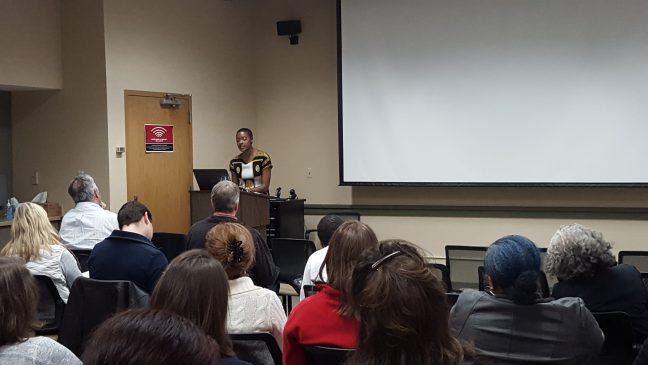As student activism begins to rise on college campuses across the nation, some professors are encouraging faculty to rise with them.
At a Carl A. Grant speaker series called “Teaching to and Through Social Justice,” Manya Whitaker, an assistant professor of social and political issues in education at Colorado College, discussed using social justice as a tool to teach students.
Colleges around the country are experiencing a rise in hate crimes, Whitaker said at the Tuesday presentation, but they are also seeing a rise in student activism on campuses too.
Students on campus are participating in this activism, Whitaker said, because they are demanding revisions of institutional structures and functions.
“Many faculty and administrators brush aside students protests and petitions and walkouts and teach-ins as things that are beyond the scope of their job duties,” Whitaker said. “What the students do outside of class isn’t of concern to so many faculty, but in my mind it really should be — because the students are not petitioning about everything except your class.”
It is the responsibility of faculty to respond to these calls, Whitaker said. Faculty can adjust how they teach their students to prepare them to thrive in the current social and political environments.
Whitaker discussed the Supreme Court case Brown v. Board of Education to draw parallels with modern-day issues. In the case, she said, the court ruled segregated schools were unconstitutional because they were not actually, “separate, but equal,” which was established in the Plessy v. Ferguson Supreme Court case.
The underlying cause of the issues found in these Supreme Court cases, she said, was the racial hierarchies which exist in the U.S. These hierarchies marginalize, oppress and disenfranchise black students, she added.
Whitaker also discussed the deaths of Michael Brown and Trayvon Martin to show the intersection of race, law and power in a modern setting. Incidents like these have caused organizations like Black Lives Matter and the Black Liberation Collective — which advocate for black peoples’ rights — to gain power, she said.
“In the five years I’ve been at my present institution I’ve witnessed a shift in [students’] language and their attitudes,” Whitaker said. “Whereas they were once accepting of — if not happy — about their experiences as some kind of minority at a predominantly white institute, the students are now impassioned and vocal.”
Whitaker said educators need to adjust the way they teach to connect students’ experiences out of class to the information learned in class. Students should not have to choose between their outside political self and their inside intellectual self, she said.
While UW student government diversifies, some say efforts fall short
Educators need to be conscious of differences between themselves and their students, Whitaker said. The differences in peoples’ identities shapes how they see the world, she added.
Whitaker said the depth of engagement with students in the classroom is also important. When they have that depth, educators can better understand students’ backgrounds and more appropriately tailor lessons which educate and empower students, she said.
“Teaching — therefore — is inherently activist work,” Whitaker said. “Though we may not be standing in front of a court house, or calling our senators or marching in the streets, teaching is an act of revolution against normalization.”


